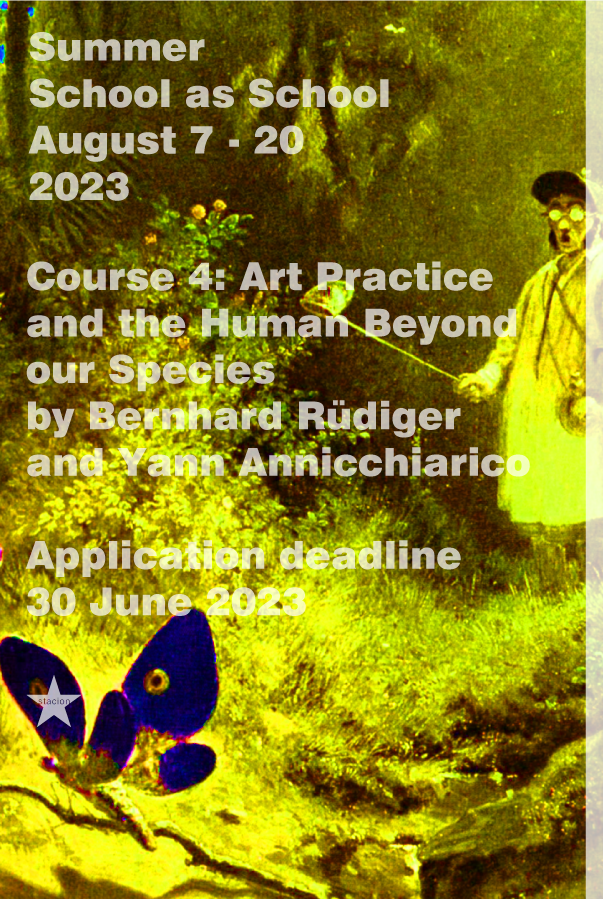
Course 4: Art Practice and the Human Beyond our Species
By Bernhard Rüdiger and Yann Annicchiarico
7 - 19 August 2023
Course Level BA/MA
5 ECTS
Course Description
In the past decade anthropologists have directed their studies of the human beyond our species, considering other lifeforms as selves in their own right. For example, Eduardo Kohn’s recent book asks questions like can forests think or do dogs dream. What strikes us in this way of reconsidering the human from an outside point of view is how this way challenges our ideas of intelligence, sensitivity or even consciousness and agency.
Far away from this approach of nature as a cohabitation of lifeforms as selves, the concept of nature, as it was assumed in the last century, still seems deeply embedded in our contemporary culture. Even if the subjects of our contemporary works seem to be very far from those of Klee for example, and deal with social, economic or political issues, our theories on the work process, on gestures and their justification, still seem to be based on an idea very close to that of modern artists. Is there not a contradiction between our concerns, the way we work in the studio and more generally how we evaluate and discuss artistic processes?
Biographies
Bernhard Rüdiger was born in Italy (Rome, 1964) and lives and works in Paris. He graduated from the Accademia di Belle Arti in Milan with Luciano Fabro and, after stints as a teacher in Tours and Valenciennes, he currently teaches in Lyon. He is editor of the magazine Tiracorrendo and was co-founder of the artists’ gallery Lo Spazio di Via Lazzaro Palazzi, a busy venue in the Milan art scene from 1989 to 1993. His works confront visitors with a physical experience involving object, body and space. At once sculptures, monumental models and architectural pieces, through their meticulous spatial and acoustic arrangement his works seek to investigate history, particularly the history of places. One example is in the semi-private garden of the Antonin Perrin residence in Lyon, in which Rüdiger installed a scaled-down model of the two old low-rise buildings destroyed in 2004 during the zone’s renovation, which recalled the history of the site and its industrial culture. Rüdiger’s works also propose direct physical experiences and the possibility that the work can react to the visitor’s presence or to natural elements. All of Rüdiger’s projects are systematically accompanied by studies and models in cardboard, wood, iron, etc., as well as drawings, but they are far more than mere stages in a creative process. They constitute part of the fully-fledged work, and are involved in specific presentations in an arrangement encompassing some 30 display stands. (Excerpts from Nadine Labedade, FRAC Centre Orléans).
The work of Yann Annicchiarico addresses our perceptions and confronts our human nature with worlds that are inaccessible to them. Inseparable from the still or moving bodies exploring a space, the act of seeing in Annicchiarico’s work prompts an awareness of the limits of our own understanding and the possibility of transcending these limits. A shift from intelligibility to sensibility occurs when we grasp the impenetrability of dimensions that are foreign, yet close. Interacting with their environment through an interplay of different scales and temporalities, Yann Annicchiarico’s installations allow one to experience the physical sensation of being on a threshold, of finding oneself in an in-between.
Yann Annicchiarico (b. 1983) has held solo exhibitions at KIT – Kunst im Tunnel in Düsseldorf (2020); Nosbaum Reding Projects, Luxembourg (2019); Centre des Arts Pluriels, Ettelbruck (2018) and has participated in group exhibitions in MUDAM - musée d'art moderne Grand-Duc Jean, Luxembourg (2021); Museo Archeologico del Chianti Senese, Castellina in Chianti, Italy (2019). He is an artist-researcher with ACTH (Contemporary Art and Historical Time) since 2011. He has participated in residency programmes at Fonderie Darling, Montreal (2019) and at Villa Médicis, Académie de France, Rome (2015). He was awarded the Bourse Francis-André in 2020 for his first solo exhibition in a public institution at KIT – Kunst im Tunnel à Düsseldorf (2020).
Participation
15 participants will be selected to participate in this course. Eligible participants must read the Terms, fill out the application form, upload the required documents and submit the application form. Incomplete applications will not be considered.
The conditions and registration fees
Enrollment fee 1 - 470 euros for self-paying students, with the offer of accommodation in student residences.
Enrollment fee 2 - 670 euros for institutionally sponsored students, with the offer of accommodation in student residences.
Special conditions apply for alumni of the Summer School as School.
Scholarships are available for students from Kosovo.
Payment must be made after successful application.
Late applications may be accepted until July 22, 2023.